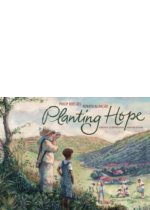Pedro is a young boy from a family of talented artists specializing in papier-mâché sculptures. Growing up surrounded by creativity, Pedro learns the art of crafting piñatas, masks, and mojigangas—giant puppets used in Mexico’s vibrant parades and festivals. As Pedro grows older, he becomes increasingly involved in the family business, honing his skills in papier-mâché sculpture. However, tragedy strikes when Pedro falls ill, plagued by terrifying nightmares of the mojigangas coming to life and chasing him. In his dreams, he is saved by fierce creatures called alebrijes, who devour the monsters. Inspired by his dreams, Pedro begins to recreate the alebrijes using paper and glue, infusing them with vibrant colors and intricate patterns. Soon, his creations attract attention from far and wide, and people flock to buy Pedro’s monster eaters.
Based on the life of artist Pedro Linares, this bilingual picture book weaves together the fascinating origin story of Mexico’s beloved folk art with striking illustrations of the magical creatures Pedro creates. It serves as a captivating introduction to the world of art for young readers and a celebration of creativity, resilience, and the power of imagination. Perfect for parents and teachers seeking to inspire children’s interest in art and cultural traditions.

